
Reform Judaism, also known as Liberal Judaism or Progressive Judaism, is a major Jewish denomination that emphasizes the evolving nature of Judaism, the superiority of its ethical aspects to its ceremonial ones, and belief in a continuous revelation which is closely intertwined with human reason and not limited to the theophany at Mount Sinai. A highly liberal strand of Judaism, it is characterized by little stress on ritual and personal observance, regarding Jewish law as non-binding and the individual Jew as autonomous, and by a great openness to external influences and progressive values.

Leopold Zunz was the founder of academic Judaic Studies, the critical investigation of Jewish literature, hymnology and ritual. Zunz's historical investigations and contemporary writings had an important influence on contemporary Judaism.

The Hebrew Union College – Jewish Institute of Religion is a Jewish seminary with three locations in the United States and one location in Jerusalem. It is the oldest extant Jewish seminary in the Americas and the main seminary for training rabbis, cantors, educators and communal workers in Reform Judaism. HUC-JIR has campuses in Cincinnati, Ohio, New York City, Los Angeles, and Jerusalem. The Jerusalem campus is the only seminary in Israel for training Reform Jewish clergy.
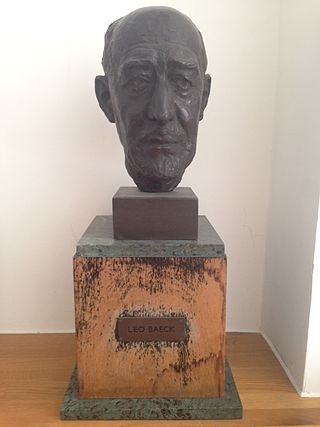
Leo Baeck was a 20th-century German rabbi, scholar, and theologian. He served as leader of Reform Judaism in his native country and internationally, and later represented all German Jews during the Nazi era. After the Second World War, he settled in London, in the United Kingdom, where he served as the chairman of the World Union for Progressive Judaism. In 1955, the Leo Baeck Institute for the study of the history and culture of German-speaking Jewry was established, and Baeck was its first international president. The Leo Baeck Medal has been awarded since 1978 to those who have helped preserve the spirit of German-speaking Jewry in culture, academia, politics, and philanthropy.

Abraham Geiger was a German rabbi and scholar who is considered the founding father of Reform Judaism. Emphasizing Judaism's constant development through its history and universalist traits, Geiger sought to re-formulate received forms and design what he regarded as a religion compliant with modern times.
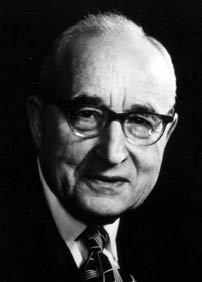
Jacob Rader Marcus was a scholar of Jewish history and a Reform rabbi.

Reform Judaism, formally the Movement for Reform Judaism (MRJ) and known as Reform Synagogues of Great Britain until 2005, is one of the two World Union for Progressive Judaism–affiliated denominations in the United Kingdom. Reform is relatively traditional in comparison with its smaller counterpart, Liberal Judaism, though it does not regard Jewish law as binding. As of 2010, it was the second-largest Jewish religious group in the United Kingdom, with 19.4% of synagogue-member households. On 17 April 2023, Reform Judaism and Liberal Judaism announced their intention to merge as one single unified progressive Jewish movement. The new movement, which may be called Progressive Judaism, will represent about 30% of British Jewry who are affiliated to synagogues.
"Wissenschaft des Judentums" refers to a nineteenth-century movement premised on the critical investigation of Jewish literature and culture, including rabbinic literature, to analyze the origins of Jewish traditions.
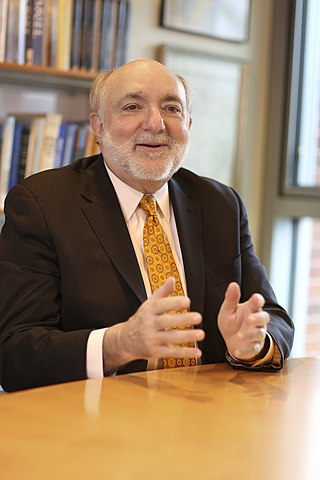
David Ellenson was an American rabbi and academic who was known as a leader of the Reform movement in Judaism. Ellenson was director of the Schusterman Center for Israel Studies and visiting professor of Near Eastern and Judaic studies at Brandeis University and previously president of the Hebrew Union College-Jewish Institute of Religion (HUC-JIR). He previously served as president of HUC-JIR from 2001 to December 31, 2013, and was later chancellor emeritus of that college until his death. Ellenson had served as interim president following the death of his successor, Aaron D. Panken until the inauguration of Andrew Rehfeld, the 10th and current President.
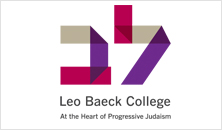
Leo Baeck College is a privately funded rabbinical seminary and centre for the training of teachers in Jewish education. Based now at the Sternberg Centre, East End Road, Finchley, in the London Borough of Barnet, it was founded by Werner van der Zyl in 1956 and is sponsored by The Movement for Reform Judaism, Liberal Judaism and the United Jewish Israel Appeal. It is named after the inspirational 20th-century German Liberal rabbi Leo Baeck.

Abraham Cronbach was an American rabbi and teacher, known as a pacifist. He served as a rabbi for congregations in Indiana and Ohio. Cronbach was one of the founders of the Peace Heroes Memorial Society.
Fritz Bamberger was a German Jewish Scholar, educator and magazine editor who directed the school system for the education of Jews in pre- World War II, was the editor-in-chief of Coronet starting in 1942, and taught and wrote in the areas of philosophy and intellectual history.

Adam S. Ferziger is an intellectual and social historian whose research focuses on Jewish religious movements and religious responses to secularization and assimilation in modern and contemporary North America, Europe and Israel. Ferziger holds the Samson Raphael Hirsch Chair for Research of the Torah with Derekh Erez Movement in the Department of Jewish History and Contemporary Jewry at Bar-Ilan University, Ramat Gan, Israel. He is a senior associate at the Oxford Centre for Hebrew and Jewish Studies and is co-convener of the annual Oxford Summer Institute for Modern and Contemporary Judaism. He has served as a visiting professor/fellow in College of Charleston (2017), Wolfson College, University of Oxford, UK (2013), University of Sydney, New South Wales, Australia (2012), and University of Shandong, Jinan, China (2005). In 2011, he received Bar-Ilan's "Outstanding Lecturer" award. Ferziger has published articles in leading academic journals of religion, history, and Jewish studies and is the author or editor of seven books including: Exclusion and Hierarchy: Orthodoxy, Nonobservance and the Emergence of Modern Jewish Identity ; Orthodox Judaism – New Perspectives, edited with Aviezer Ravitzky and Yoseph Salmon ; and most recently Beyond Sectarianism: The Realignment of American Orthodox Judaism, which was the winner of a 2015 National Jewish Book Award.
Eugene B. Borowitz was an American leader and philosopher in Reform Judaism, known largely for his work on Jewish theology and Jewish ethics. He also edited a Jewish journal, Sh'ma, and taught at the Hebrew Union College-Jewish Institute of Religion.

The Leo Baeck Institute, established in 1955, is an international research institute with centres in New York City, London, Jerusalem and Berlin, that are devoted to the study of the history and culture of German-speaking Jewry. The institute was founded in 1955 by a consortium of influential Jewish scholars including Hannah Arendt, Martin Buber and Gershom Scholem. The Leo Baeck Medal has been awarded since 1978 to those who have helped preserve the spirit of German-speaking Jewry in culture, academia, politics, and philanthropy.
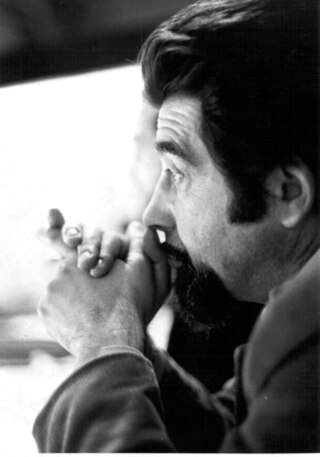
Steven S. Schwarzschild (1924–1989) was a rabbi, philosopher, theologian, and editor.

Werner van der Zyl was a rabbi in Berlin and in London, where he came in 1939 as a refugee rabbi from Germany. He was the prime mover and first director of studies of the Jewish Theological College of London. The college was inaugurated in 1956 and was renamed Leo Baeck College shortly afterwards at his suggestion.
Sybil Ann Sheridan is a writer and British Reform rabbi. She was chair of the Assembly of Reform Rabbis UK at the Movement for Reform Judaism from 2013 to 2015 and was Rabbi at Wimbledon and District Synagogue in south west London. As of 2020 she is part-time rabbi at Newcastle Reform Synagogue.

Lance Jonathan Sussman is a historian of American Jewish History, college professor, Chair of the Board of Governors of Gratz College, Melrose Park, PA and until summer 2022 the senior rabbi, now emeritus, at Reform Congregation Keneseth Israel (KI) located in Elkins Park, PA. He is the author of books and articles including: Isaac Leeser and the Making of American Judaism (1995) and Sharing Sacred Moments (1999), and a co-editor of Reform Judaism in America: A Biographical Dictionary and Sourcebook (1993) and New Essays in American Jewish History (2009). Since 2010 he has also published articles on Judaism and art.
Michael Brenner is a German historian who researches and publishes on the history of Jews and Israel. Brenner has authored eight books on Jewish history, which were translated into twelve languages and is the editor and co-editor of eighteen books. He holds teaching positions at both the Ludwig Maximilian University of Munich and the American University.















